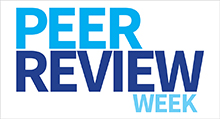 It’s here – the first (but hopefully not the last) Peer Review Week! Over the past few weeks, it’s been great to see the community rally to contribute to celebrating peer review and the fundamental role it plays in scholarly communications.
It’s here – the first (but hopefully not the last) Peer Review Week! Over the past few weeks, it’s been great to see the community rally to contribute to celebrating peer review and the fundamental role it plays in scholarly communications.
Given the short notice (it was conceived in August and announced on September 10) and limited resources (just four organizations – ORCID, ScienceOpen, Sense About Science, and Wiley – were involved in the initial planning), the response has been encouraging – in the first two weeks there were 340 tweets from 180 twitter handles. And the depth and breadth of organizations and people who are getting involved is encouraging; from major publishers like Elsevier, Oxford University Press, and Taylor & Francis to smaller organizations like ISMTE (the International Society of Managing and Technical Editors), Publons, and Open Scholar, it’s been very heartening to see so many positive responses. The types of activities being planned are also diverse — and, in some cases, being kept secret until later in the week so keep your eyes open! (Spoiler alert – at ORCID we will be announcing the first implementations of our new peer review functionality, which enables organizations to recognize all sorts of review activities by adding them to the reviewer’s ORCID record.)
But the real question is, should Peer Review Week become an annual event? Is there enough enthusiasm within our community to support it? If so, who should organize it? How will it be resourced? When should it take place?
It’s probably clear by now that I and my fellow Peer Review Week 2015 volunteers would love to see Peer Review Week continue. Peer review is at the heart of so many elements of scholarly communications – not just publications but grants, conference submissions, promotion and tenure, and more. It’s something that most researchers do, yet they are rarely recognized for it. Surveys (such as this) show that most of them don’t want or expect any monetary reward for reviewing, but they would like their efforts to be formally acknowledged in some way. And increasingly they want their institutions to appreciate the value of reviews to the scholarly communications process – and to recognize the amount of time being spent on it.
Our hope is that, if it becomes an annual event, Peer Review Week can help, by providing the scholarly community with an opportunity to focus on why peer review matters, to debate the many diverse efforts to support and improve it and, above all, to recognize the researchers who dedicate so much time and care to it.
We’d very much like to hear your views. Are you celebrating Peer Review Week 2015? If so, what are you doing? If not, why not? Would you like it to become an annual event? Is September the right time? How should it be organized in future? Would you/your organization like to get involved?
Whatever happens, we hope that Peer Review Week 2015 will create some immediate momentum, as well as some longer-lasting benefits for the scholarly community. To that end, Sense About Science plans to make any peer review resources shared this week available on their blog; similarly, ScienceOpen will be adding a thematic bundle on peer review to its existing Collections. Maybe next year we will be able to create a community-wide site for peer review resources!
In the meantime, you can join in Peer Review Week 2015 by tweeting (#peerrevwk15), downloading and using the logo, attending the free webinar on Trust and Transparency in Peer Review, sharing the many blog posts that will be published this week (and/or writing your own!), and organizing your own events in your community.
Discussion
15 Thoughts on "Welcome to Peer Review Week!"
Great to see growing drive to acknowledge scientific peer reviewiewing work, and kudos to people setting up #peerrevwk15! Hope this helps to pave way to meaningful acdemic recognition for peer reviewing work on 52 weeks, every year.
Peerage of Science will highlight the campaign on our website News & Views -section, and link to associated blogs in our user newsletter at the end of the week. Also looking forward to contributing to discussions.
Are we celebrating only “scientific peer reviewing” of journal articles or peer reviewing in general in academe? because if it is the latter, then the comment about reviewers not expecting any compensation is out of place because reviewers of book manuscripts do get paid an honorarium. I think it ill advised to limit the celebration of peer review just to journals, let alone just to STEM journals. That does not reflect its full role in the advancement of scholarship. As so often with TSK, book publishing gets marginalized.
I am delighted about the ‘Peer Review Week’ and would like to offer all kinds of support. It might be organised in conjunction with the annual APE Conference in January,
This international conference brings all stakeholders together. APE was started 10 years ago to create (better) awareness about what academic publishing means and the role of information in science and society. Peer Review and improved scholarly communication have always been high on the Agenda and Science Publisher Kent Anderson made a big plea this January (‘Peer Review – A Publisher Value-Add? Or Essential to the Scientific Communication System?’ Soon to be published).
APE 2016 will be held 19-20 January 2016 in the Berlin Brandenburg Academy of Sciences: http://www.ape2016.eu
Motto: The Digital Agenda: The Road Ahead for Scholarly Communication.
Sandy – this week is absolutely intended to be a celebration of peer review in all its many shapes and forms and you are quite right to remind us that this includes reviewing book manuscripts and also subjects other than STM subjects. So I’d welcome feedback, ideas, and information from anyone outside of STM journals publishing about how they are – or would like to – participate in Peer Review Week this year or in future. Thanks!
I would suggest approaching Peter Berkery, Executive Director of the AAUP, about an appropriate way for the AAUP to get involved.
Hi Alice, I would be happy to help organize Peer Review Week; there are many important issues to be discussed.
Look forward to hearing from you.
Mary Ann Liebert
President & CEO
Mary Ann Liebert, Inc.
140 Huguenot Street
3rd Floor
New Rochelle, New York 10801
914-740-2100
ISMTE is excited to participate in Peer Review Week 2015 and in the development of this initiative in future years. Our society will be including links to peer review articles and posts in our weekly member e-blast and using our social media forums to keep our members up to date on this week’s events.
A CMAJ contribution to Peer Review Week, see: http://cmajblogs.com/peer-reviewers-we-couldnt-do-without-you/
The Text and Academic Authors Association (TAA) is happy to be participating in Peer Review Week and would be interested in being involved next year! @TextandAcademic http://www.TAAonline.net


